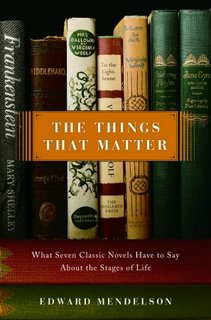Saturday, August 12, 2006
1:08 am by M.
 The Washington Posts
The Washington Posts reviews
The Things That Matter. What Seven Classic Novels Have to Say About the Stages of Life by Edward Mendelson. Two of the classics that Mendelson has chosen is Charlotte Brontë's Jane Eyre and Emily Brontë's Wuthering Heights:
The essays on the Bronte sisters are excellent, distinguishing Emily, the visionary who valorized childhood, from Charlotte, who -- like George Eliot -- craved an adult relationship (both in fiction and life) that promised parity and mutual respect. But these essays beg for actual conversation -- about life, about books. "Mendelson says Heathcliff is the only stormy, Byronic hero in English literature who doesn't have a sex drive," I told my daughter as we were driving to a baby shower. "That's why women love him," she answered cryptically, and she wasn't talking about Mendelson.From
Pantheon Books, the publishers:
An illuminating exploration of how seven of the greatest English novels of the nineteenth and twentieth centuries--Frankenstein, Wuthering Heights, Jane Eyre, Middlemarch, Mrs. Dalloway, To the Lighthouse, and Between the Acts--portray the essential experiences of life.
For Edward Mendelson--a professor of English and comparative literature at Columbia University--these classic novels tell life stories that are valuable to readers who are thinking about the course of their own lives. Looking beyond theories to the individual intentions of the authors and taking into consideration their lives and times, Mendelson examines the sometimes contradictory ways in which the novels portray such major passages of life as love, marriage, and parenthood. In Frankenstein’s story of a new life, we see a searing representation of emotional neglect. In Wuthering Heights and Jane Eyre the transition from childhood to adulthood is portrayed in vastly different ways even though the sisters who wrote the books shared the same isolated life. In Mrs. Dalloway we see an ideal and almost impossible adult love. Mendelson leads us to a fresh and fascinating new understanding of each of the seven novels, reminding us--in the most captivating way--why they matter.The Things That Matter is a book that will delight all passionate readers.
Categories: Books, Charlotte_Brontë, Jane_Eyre,Emily_Brontë, Wuthering_Heights









0 comments:
Post a Comment